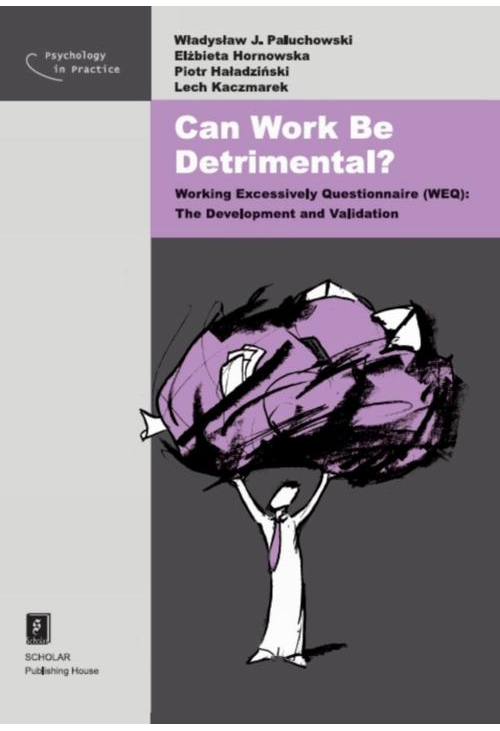
- -22%
ebook Can Work Be Detrimental? Working Excessively Questionnaire (WEQ): The Development and Validation
Czy praca może być szkodliwa? Jak rozróżnić między intensywną pracą a uzależnieniem od niej, czyli workoholizmem? Odpowiedzi na te pytania znajdziesz w ebooku "Can Work Be Detrimental? Working Excessively Questionnaire (WEQ): The Development and Validation" autorstwa Władysława Jacka Paluchowskiego, Elżbiety Hornowskiej, Piotra Haładzińskiego i Lecha Kaczmarka wydanego przez Scholar w 2014 roku.
Dla niektórych intensywny wymiar czasu pracy jest źródłem satysfakcji, podczas gdy dla innych wynika z chęci sprostania oczekiwaniom własnym i zewnętrznym. Czasami spełniająca pracę wypełnia nasze życie, ponieważ dostarcza nam wszystkiego, czego potrzebujemy, aby być szczęśliwymi. Praca może być akceptowalnym sposobem ucieczki od problemów emocjonalnych. W niektórych przypadkach intensywny wymiar czasu pracy wynika ze strachu przed utratą pracy, a czasami z niewłaściwej organizacji pracy. Innym powodem może być to, że jest to finansowo opłacalne.
Wydanie elektroniczne książki "Can Work Be Detrimental? Working Excessively Questionnaire (WEQ): The Development and Validation" dostępne w formatach PDF i epub oferuje głębokie zrozumienie relacji między intensywną pracą a uzależnieniem od niej. Ebook ten jest idealnym wyborem dla osób zainteresowanych psychologią pracy, w tym workoholizmem oraz dla tych, którzy szukają sposobów na rozróżnienie intensywnej pracy od uzależnienia.
Kup e-booka "Can Work Be Detrimental? Working Excessively Questionnaire (WEQ): The Development and Validation" w sklepie z ebookami i czytaj go na swoim urządzeniu. Pobierz ebook teraz i rozpocznij fascynującą podróż po świecie intensywnej pracy oraz jej konsekwencji dla zdrowia psychicznego i fizycznego. E-booki takie jak ten są niezbędne do zrozumienia współczesnych wyzwań zawodowych oraz sposobów radzenia sobie z nimi.
Spis treści ebooka Can Work Be Detrimental? Working Excessively Questionnaire (WEQ): The Development and Validation
Preface 9Chapter 1
Excessive workload 13
Work and its place in life 13
The psychopathology of work 16
Workload 16
Work addiction 21
Workaholism as a behavioral addiction (non-chemical addiction) 26
Workaholism: The moderating effects of individual and contextual factors 28
The most obvious negative consequences of workaholism 33
Subjective effects 33
Work-family conflict 34
The organizational effects 36
Theoretical explanations of workaholism 36
Chapter 2
Refinement and further validation of the working excessively
questionnaire (WEQ) 39
Various measures of workaholism 39
Questionnaire to measure work addiction (WART) 39
Spence and Robbins’ scales to test workaholism (WorkBAT) 41
Abbreviated scale to test workaholism (WorkBAT-R) 42
Sub-scale of the questionnaire Schedule for Nonadaptive Personality
(SNAP-Work) 42
Scales for testing susceptibility to workaholic behaviors (SWBT) 43
Dutch Work Addiction Scale (DUWAS) 44
Workaholism Analysis Questionnaire (WAQ) 44
Bergen Work Addiction Scale (BWAS) 45
The Scale of Being Absorbed by Work (SZAP) 46
Multidimensional Questionnaire for Workaholism Assessment (WKOP) 46
Conclusions 47
Methodological consequences 48
Conceptualizing our questionnaire 49
Item pool development 50
Final refinement of the questionnaire 52
The sample 52
Scale statistics 54
Scale reliabilities and intercorrelations 56
Criterion analysis 56
Criterion-related and construct validity
Correlations with self-reported symptoms of work addiction 63
Content sub-scales analysis 64
Summary 67
Chapter 3
Analyzing correlates of the Working Excessively Questionnaire
(WEQ) 69
Scales and questionnaires used in the research 69
Multidimensional Self-Esteem Inventory (MSEI) 71
Internal-External Locus of Control at Work Scale 71
Temperament Survey for Adults (EAS-TS) 71
The Temperament and Character Inventory (TCI) 72
The Hope Scale 72
Need for Achievement Questionnaire 73
The Relationships Questionnaire (RQ) 73
The Lack of Control over Work Scale and its correlates 73
The relationship between lack of control over work and locus of control 75
The relationship between lack of control over work and identity integration
and other components of self-esteem 76
The relationship between lack of control over work and work seniority 78
The relationship between lack of control over work and sense of mission 79
The relationship between lack of control over work and temperament traits 83
Conclusion 85
Perfectionist Working Style Scale and its correlates 86
The relationship between perfectionist working style and perceived self-control
and other components of self-esteem 87
The relationship between perfectionist working style and locus of control 89
The relationship between perfectionist working style and hope for success 91
The relationship between perfectionist working style and temperament traits 92
Conclusion 93
General Beliefs about Work Scale and its correlates 94
The relationship between assigning a specific role to work and the assessment
of a person’s own competences and intimate relationships 95
The relationship between the attachment pattern and beliefs about work 96
The relationship between assigning an important role to work, sociability,
and a person’s hope for success 97
Defining a person’s value based on their work and their willingness to enter into
intimate relationships 98
The relationship between general beliefs about work and sense of mission 99
The relationship between general beliefs about work and traits of temperament
and character 100
Conclusion 100
Perceived Oppressiveness of Organization Scale and its correlates 101
The relationship between perceiving the organization as oppressive and locus
of control and tendency to react with negative emotional arousal 103
The relationship between work position and perceived oppressiveness of the
organization 106
The relationship between perceived oppressiveness of the organization and defensive
self-enhancement 107
The relationship between perceived oppressiveness of the organization and
sociability 108
Conclusion 108
Conclusion 110
References 112
Szczegóły ebooka Can Work Be Detrimental? Working Excessively Questionnaire (WEQ): The Development and Validation
- Wydawca:
- Scholar
- Rok wydania:
- 2014
- Typ publikacji:
- Ebook
- Język:
- angielski
- Format:
- Liczba stron:
- 128
- Miejsce wydania:
- Warszawa
- ISBN dla wersji papierowej:
- 9788373837041
Recenzje ebooka Can Work Be Detrimental? Working Excessively Questionnaire (WEQ): The Development and Validation
-
Reviews (0)

Na jakich urządzeniach mogę czytać ebooki?
- -22%

















@CUSTOMER_NAME@
@COMMENT_TITLE@
@COMMENT_COMMENT@